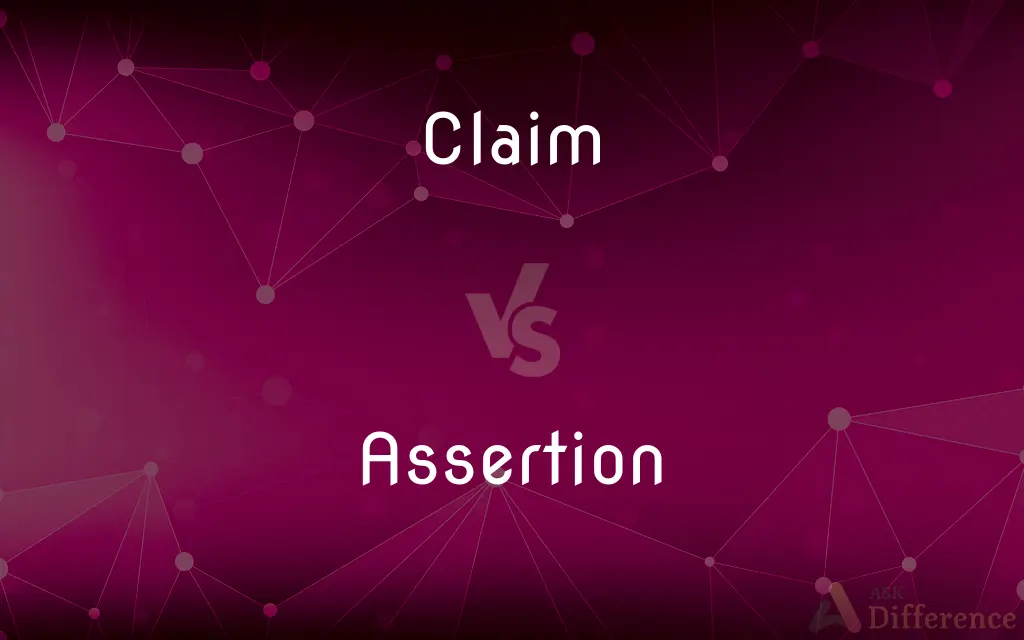Claim vs. Assertion — What's the Difference?
By Urooj Arif & Fiza Rafique — Updated on March 2, 2024
A claim typically requires substantiation and is used in arguments or legal contexts, focusing on rights or entitlements. An assertion is a confident and forceful statement of fact or belief, not necessarily backed by evidence.

Difference Between Claim and Assertion
Table of Contents
ADVERTISEMENT
Key Differences
A claim is often presented in the context of an argument, debate, or legal matter, where it serves as a statement or demand for something due, based on rights or evidence. It implies that there is a need for substantiation or proof to support its validity. For instance, in a courtroom, a claim made by a plaintiff must be backed by evidence to be considered by the judge or jury. On the other hand, an assertion is a statement that is declared to be true, often without the immediate requirement for evidence. Assertions are used to express beliefs, opinions, or facts, with the speaker presenting these as true, regardless of the presence of immediate proof.
Claims often carry a connotation of dispute or contention, especially in legal and formal contexts, where they denote a formal demand or assertion of a right. For example, a patent claim demands exclusive rights to an invention. Assertions, however, can be part of everyday conversation or writing, used to state something forcefully as a fact, but not necessarily inviting the rigorous scrutiny or the need for evidence that a claim invites.
In academic writing or critical thinking, making a claim typically involves stating something that can be argued for or against, requiring evidence and reasoning to support it. Assertions, while they can also be challenged, are often presented as self-evident truths, and the burden of proof might not be as immediately pressing.
When someone makes a claim, they are usually prepared to defend it with evidence and reasoning, anticipating counterarguments. In contrast, an assertion might be presented without the same level of preparation for defense, reflecting more on the speaker's confidence or belief in the statement's truth.
In the legal arena, claims must be filed according to specific procedures and supported by sufficient evidence to be upheld, reflecting a structured process of validation. Assertions, while they can be part of legal arguments, do not in themselves constitute a formal demand or right and are more about stating a position or fact within those arguments.
ADVERTISEMENT
Comparison Chart
Definition
A demand for something as due; requires substantiation.
A confident and forceful statement of fact or belief.
Context
Often used in arguments, debates, and legal matters.
Can be used in everyday conversation and writing.
Requirement for Evidence
Typically requires evidence or proof.
Does not necessarily require immediate proof.
Connotation
Can imply dispute or contention.
Often seen as stating a self-evident truth.
Purpose
To demand rights or entitlements based on evidence.
To express beliefs or facts confidently.
Compare with Definitions
Claim
A claim is a demand for rights or entitlements with expected substantiation.
The tenant filed a claim for the return of his deposit.
Assertion
It is often presented without needing immediate evidence.
Her assertion of innocence was accepted without question.
Claim
It is used in arguments to assert a right based on evidence.
Her claim to the inheritance was supported by the will.
Assertion
An assertion is a confident statement of belief or fact.
He made an assertion that the project would be completed on time.
Claim
Claims are subject to dispute and require defense.
The scientist's claim about the new discovery demanded rigorous proof.
Assertion
Assertions can express opinions forcefully.
The politician's assertion about the policy's success stirred debate.
Claim
Claims aim to establish a fact or right with backing.
The author made a claim for copyright infringement.
Assertion
They are used to state facts or beliefs with certainty.
The scientist's assertion of the theory's validity sparked interest.
Claim
In legal contexts, a claim involves formal procedures.
He submitted a claim for damages after the car accident.
Assertion
Assertions reflect confidence in the stated truth.
His assertion of her talent was evident in his enthusiastic support.
Claim
State or assert that something is the case, typically without providing evidence or proof
‘I'm entitled to be conceited,’ he claimed
Not every employee is eligible to claim unfair dismissal
The Prime Minister claimed that he was concerned about Third World debt
Assertion
Something declared or stated positively, often with no support or attempt at proof.
Claim
Formally request or demand; say that one owns or has earned (something)
If no one claims the items, they will become Crown property
Assertion
The act of asserting.
Claim
A demand for payment in accordance with an insurance policy or other formal arrangement.
Assertion
The act of asserting; positive declaration or averment.
Claim
A new statement of something one believes to be the truth, usually when the statement has yet to be verified or without valid evidence provided.
The company's share price dropped amid claims of accounting fraud.
Assertion
Something which is asserted; a declaration; a statement asserted.
You're a man of strong assertions!
Claim
To ask for, or seek to obtain, by virtue of authority, right, or supposed right; to challenge as a right; to demand as due.
Assertion
The act of asserting, or that which is asserted; positive declaration or averment; affirmation; statement asserted; position advanced.
There is a difference between assertion and demonstration.
Claim
A demand of a right or supposed right; a calling on another for something due or supposed to be due; an assertion of a right or fact.
Assertion
The act of affirming or asserting or stating something
Claim
A right to claim or demand something; a title to any debt, privilege, or other thing in possession of another; also, a title to anything which another should give or concede to, or confer on, the claimant.
Claim
The thing claimed or demanded; that (as land) to which any one intends to establish a right; ; as, a settler's claim; a miner's claim.
Claim
An informal right to something;
His claim on her attentions
His title to fame
Claim
Ask for legally or make a legal claim to, as of debts, for example;
They claimed on the maximum allowable amount
Claim
Take as an undesirable consequence of some event or state of affairs;
The accident claimed three lives
The hard work took its toll on her
Common Curiosities
What differentiates a claim from an assertion?
A claim is a demand or statement that typically requires evidence and is often associated with rights or entitlements, while an assertion is a confident statement of fact or belief not necessarily requiring immediate proof.
Can an assertion become a claim?
Yes, an assertion can become a claim if it is challenged and requires substantiation to be accepted as valid in an argument or legal context.
Why is evidence important for a claim?
Evidence is crucial for a claim because it substantiates the demand or statement, providing the basis upon which the claim is accepted or rejected.
Are all assertions true?
Not necessarily; assertions are statements made with confidence but are not always backed by evidence at the moment they are made and can be subject to verification.
How do claims function in legal contexts?
In legal contexts, claims represent formal demands for rights or entitlements that must be substantiated with evidence and follow specific legal procedures to be considered valid.
Can a claim be made without evidence?
A claim can be made without evidence initially, but for it to be recognized and validated, especially in formal or contentious settings, evidence is usually required.
What role do assertions play in communication?
Assertions play a crucial role in communication by allowing individuals to express beliefs, opinions, and facts confidently, shaping the flow and tone of the discourse.
Is making a claim always a formal process?
While making a claim often involves a formal process, especially in legal or academic contexts, claims can also be made in less formal settings where they still require substantiation.
How do assertions impact arguments or discussions?
Assertions can strongly impact arguments or discussions by stating positions forcefully, potentially swaying opinions or prompting further examination of the stated facts or beliefs.
How do cultural perceptions affect the acceptance of assertions?
Cultural perceptions can significantly affect the acceptance of assertions, as what is considered self-evident or true can vary greatly between different cultures and societal norms.
Share Your Discovery

Previous Comparison
Grind vs. Mill
Next Comparison
Amplify vs. MagnifyAuthor Spotlight
Written by
Urooj ArifUrooj is a skilled content writer at Ask Difference, known for her exceptional ability to simplify complex topics into engaging and informative content. With a passion for research and a flair for clear, concise writing, she consistently delivers articles that resonate with our diverse audience.
Co-written by
Fiza RafiqueFiza Rafique is a skilled content writer at AskDifference.com, where she meticulously refines and enhances written pieces. Drawing from her vast editorial expertise, Fiza ensures clarity, accuracy, and precision in every article. Passionate about language, she continually seeks to elevate the quality of content for readers worldwide.
















































